B5 – Channeling Indonesian Best Practices of Nature-Based Solutions and Decarbonization towards Net Zero Emission
- Indonesia Pavilion COP29
- Tuesday, 12 November 2024
- 14.00 - 15.20 (Baku Time GMT+4)

About
A. Background
Indonesia is a biodiversity-rich nation with vast natural resources, including extensive coastal ecosystems, tropical rainforests, and rich agricultural lands. These natural resources play a pivotal role in addressing climate change through nature-based solutions (NBS) that enhance ecosystem resilience while reducing greenhouse gas emissions. Indonesia’s leadership in the Agriculture, Forestry, and Other Land Use (AFOLU) sector, coupled with its commitment to integrating blue carbon ecosystems, such as mangroves and seagrass beds, into climate mitigation strategies, positions the country as a key player in global carbon markets.
The National Blue Carbon Action Partnership and the blue carbon framework are key components of Indonesia’s strategy to harness the potential of its coastal and marine ecosystems. With over 3 million hectares of mangrove forests, Indonesia is home to one of the world’s largest blue carbon sinks, and projects such as Mangrove for Coastal Resilience exemplify how ecosystem restoration and conservation can not only mitigate climate impacts but also support biodiversity, livelihoods, and coastal protection.
The business-to-business (B2B) carbon market for the forestry and land use (FOLU) sector is gaining momentum as companies increasingly seek to offset their emissions. This market includes voluntary and regulated carbon credits, with a particular focus on nature-based solutions like forest conservation, reforestation, and sustainable land management.
Nature-Based Solution are particularly effective because they harness the ability of ecosystems to absorb carbon dioxide, regulate water cycles, and provide habitat for wildlife, while simultaneously supporting human livelihoods. Unlike traditional engineering solutions, nature-based approaches often provide multiple benefits, including enhancing ecosystem resilience, improving community well-being, and promoting sustainable development.
In Indonesia, the FOLU Net Sink 2030 initiative plays a critical role in reducing emissions by leveraging forest carbon potential. The government has partnered with businesses and civil society to achieve significant progress in mitigating deforestation and promoting carbon sequestration projects. This collaboration is fostering opportunities for B2B carbon credit transactions, with many corporates looking to offset their emissions by purchasing high-quality credits generated from forestry projects in Indonesia.
On the other aspect, the transition to a low-carbon economy presents opportunities for growth, innovation, and leadership; however, it also raises critical questions about equity and inclusiveness, particularly in sectors with high carbon intensity, such as the shipping industry and energy production.
The shipping industry, which plays a vital role in Indonesia’s economy, must also undergo decarbonization. The development of green ports is a crucial part of this transformation.
This session will explore how Indonesia is channeling its best practices in nature-based solutions and AFOLU projects into the carbon market; and Indonesia’s actions to ensure a just and equitable transition, particularly in sectors like shipping and energy. It will focus on the potential for blue carbon projects to contribute to climate action, the role of carbon project developers in scaling these efforts, and how international carbon markets can unlock financing for sustainable development and ecosystem preservation.
B. Objective and Output
The key objectives of this session are to:
- Showcase Indonesia’s best practices in implementing nature-based solutions (NbS) and AFOLU projects, with a particular focus on blue carbon initiatives such as mangrove restoration and seagrass conservation.
- Present the National Blue Carbon Action Partnership and Indonesia’s blue carbon framework as strategic tools for integrating coastal ecosystems into the global carbon market.
- Discuss the role of carbon project developers in facilitating and scaling carbon offset projects that support ecosystem restoration and generate carbon credits.
- Highlight the success of projects like Mangrove for Coastal Resilience, emphasizing their co-benefits for climate mitigation, biodiversity conservation, and community livelihoods.
- Explore opportunities for carbon market integration, focusing on how Indonesia can leverage its natural capital to access carbon finance and support long-term sustainable development.
- Discuss the role of decarbonization in the shipping industry and the development of green ports as essential components of Indonesia’s sustainable infrastructure and economic growth.
The session will provide a platform for stakeholders to share best practices and lessons learned, with the aim of identifying pathways to enhance Indonesia’s participation in the global carbon market through nature-based solutions, AFOLU projects, and decarbonization efforts.
C. Target and Audiences
This session is aimed at:
- Government officials from the Ministry of Environment and Forestry, Ministry of Marine Affairs and Fisheries, and Ministry of Agriculture.
- Carbon project developers and investors seeking to participate in nature-based solutions and blue carbon projects.
- International climate organizations and carbon market experts, including representatives from the United Nations Framework Convention on Climate Change (UNFCCC) and the Voluntary Carbon Market (VCM).
- Environmental NGOs and researchers specializing in nature-based solutions, blue carbon, and AFOLU sectors.
- Local communities and indigenous groups involved in carbon projects and ecosystem restoration.
- Private sector leaders in industries such as finance, sustainability, and climate tech, interested in carbon credits and green investments.
D. Session Format
The session will perform a talk show will run short presentation, discussion Q&A and recommendation.
Live Stream
Presentations
Keynote Speakers

H.E. Mari Elka Pangestu
Indonesia's Presidential Special Envoy for International Trade and Multilateral Cooperation

Nani Hendiarti
Deputy Coordinating Minister, Coordinating Minister for Food Affairs of the Republic of Indonesia

Alya Alharmoodi
Assistant undersecretary for sustainable communities at the UAE Ministry of Climate Change and Environment
Closing Remarks

Hendra Yusran Siry
Director General for Marine Spatial Management, Minister of Marine Affairs and Fisheries, Republic of Indonesia
Speakers

John Anis
CEO of Pertamina (Persero) New & Renewable Energy

Annisa Ayu Soraya
Green Business Coordinator of ID Survey

Dissa Natria
Enviromental Specialist of PT SUCOFINDO

Roel Hoenders
Head of Climate Action and Clean Air, International Maritime Organization
Discussant

Muhammad yusuf
Director of Coastal and small Island Utilizations, Ministry of Marine Affairs and Fisheries of the Republic of Indonesia





































